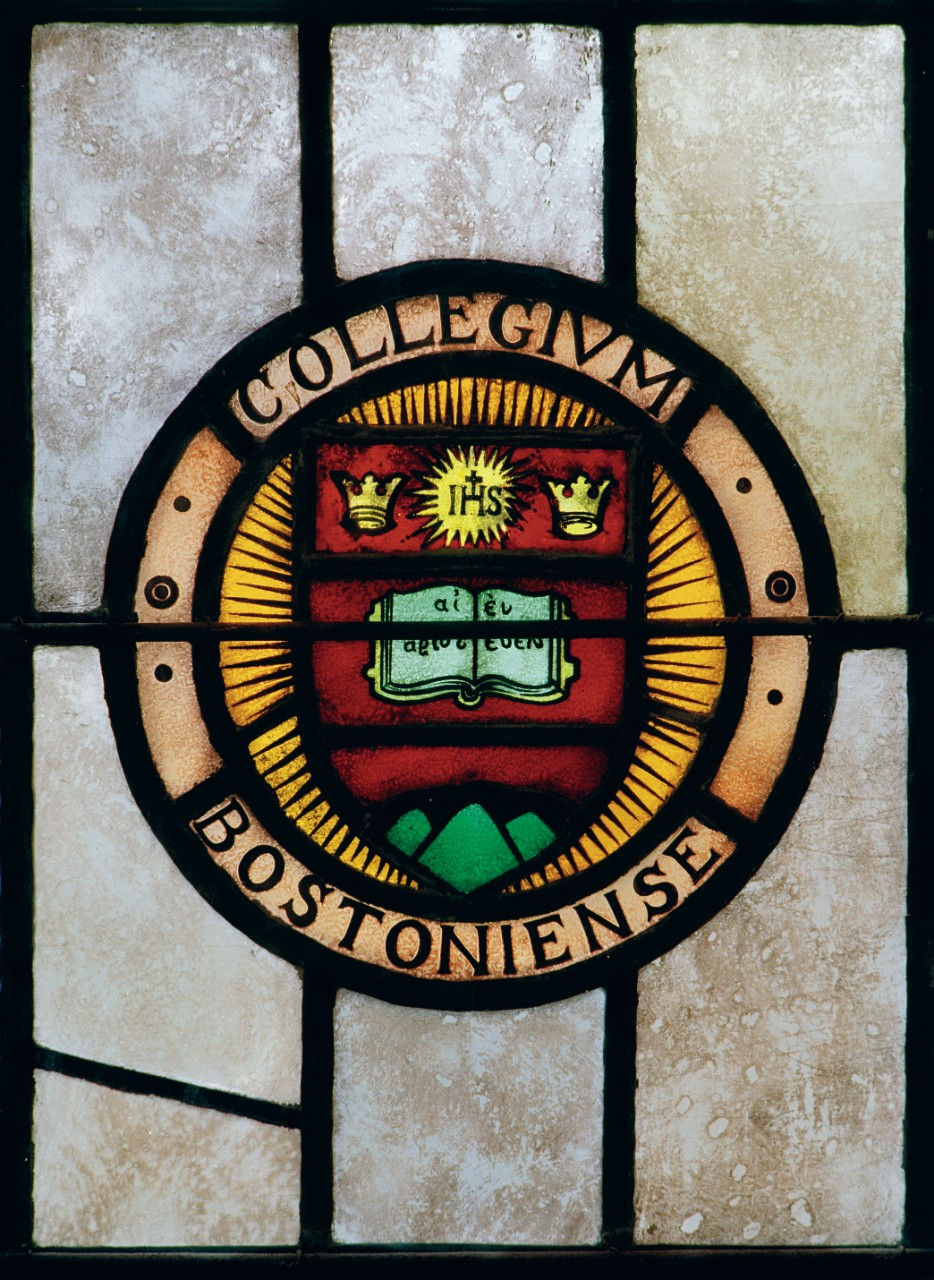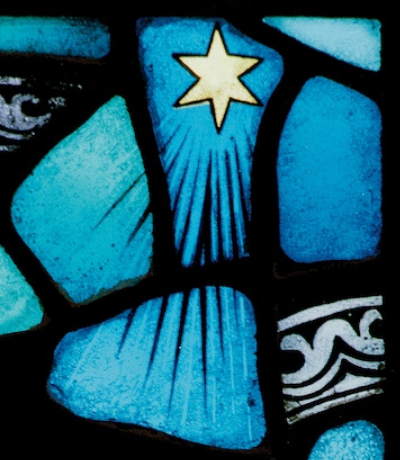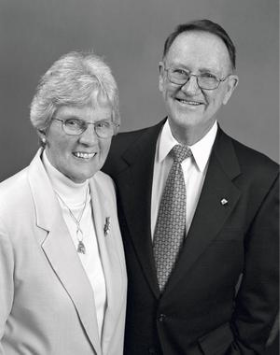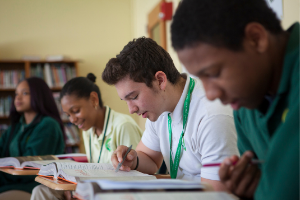About the Roche Center
Mission and Vision

Mission:
The Roche Center for Catholic Education forms educators who are agents of change, working as a community to build excellent and equitable Catholic PreK-12 schools.
Vision:
Attentive to the current moment and drawing on our faith as a source of strength and sustenance, the Roche Center team will accompany educators and leaders to reinvigorate, revitalize, and breathe new life into Catholic schools and communities through a commitment to educating students as whole persons and building a socially just and equitable world.
Animating Beliefs & Core Values

Drawing on our Catholic and Ignatian traditions, the following beliefs animate the work of the Roche Center for Catholic Education:
We believe education is about forming the heart, mind, and soul. In Ignatian spirituality, attention to holistic formation is known as the cura personalis, or "care of the whole person." Recognizing that individuals are more than their minds, our programs are designed around Boston College’s formation triangle, in which we attend to the spiritual, communal, and intellectual dimensions of formation, with specific attention to the unique gifts and vocation of the Catholic educator.
We strive for the Magis. Magis translated means “more,” signifying that we strive for excellence in all we do, and recognizing that all we do is for the greater glory of God.
We are companions on the journey. We accompany others on the journey of life, sharing our gifts and honoring the talents of others, while pursuing equity and justice. As we are women and men for others, we do this with special attention to the needs of the poor and marginalized.
We see God in all things. A tenet of Ignatian spirituality is the understanding that God is in all things, from the incredible once-in-a-lifetime opportunities to the seemingly mundane everyday routines. We view our ministry as a practice in attentiveness to the movement and direction of the Spirit.
We are committed to bringing about a socially just and equitable world. We form and educate persons as agents of change who engage in critical thought, dialogue on moral and ethical issues, and contribute to excellence and equity in Catholic education.
We develop Catholic educators to be adaptable, attentive, visionary, humble and joyful.
Being formed in the Ignatian tradition of adaptability means that we are willing to let God mold and change us. Through curiosity and genuine interest in others, we become open to new ways of seeing, understanding and doing. Adaptability requires us to be present to God’s activity in the now so that we can respond in ways that are creative and congruent to the situation, while also being compassionate and constructive. When we understand that God’s activity permeates the present moment, we are able to surrender the stubbornness that often denies ourselves and others the opportunity to explore, change and grow.
Being formed in the Ignatian tradition of attentiveness means that we are vigilant to the movements of our hearts. In reflection, we become aware of the unique ways in which God is loving us, including how God communicates with and through our lives and unique situations. It means we are also attuned to the ways in which God is loving others and working in and through their lives and the activity of the world. Attentiveness is a habit of the heart that helps us see God in all things, and that helps us detect God’s fingerprints as we walk through the world.
Being formed in the Ignatian tradition of vision means that we desire to see as God sees. Aware that our own perspective is much narrower and more limiting than God’s, we ask for the corrective lenses of grace to see ourselves, others and the world in new and enriching ways. While the process can feel dizzying and disorienting, we trust that God’s perfect vision — which we desire to become our own vision — will allow us to see much more clearly, expansively and inclusively.
Being formed in the Ignatian tradition of humility means that we acknowledge the beautiful mosaic and totality of who we are before God. This includes our talents and tendencies as well as our limitations and lack, and how we love and live in the world. Humility does not demand that we ‘shrink’ to become less than we are; rather it challenges us to recognize that all we are and all we have, as well as who we are becoming is wholly dependent on God. The foundation for all other virtues, humility invites us to admit that we cannot go it alone and that we need God and others — not only to live, but to thrive. Authentic humility is always freeing because it leaves room and responsibility for God.
Being formed in the Ignatian tradition of joy means that we pay attention to interior emotions and feelings because where we experience joy and peace are good indicators of God’s desires for us. While happiness is fleeting and can fluctuate with events or interactions, joy is stable. It lingers long after happiness has come and gone, and it urges us to stay the course in difficult times. Joy is the subtle constant that reminds us that fear, violence, destruction and death do not have the final word.
History of the Roche Center

Established by the Boston College Board of Trustees in 2007, The Barbara and Patrick Roche Center for Catholic Education of the Lynch School of Education and Human Development builds on more than a half-century of research, teaching, and outreach related to Catholic schools at Boston College. It brings under one banner strategic initiatives to develop vibrant and revitalized models for the future of Catholic education as an apostolate of hope.
The Roche Family
In March of 2010, long-time friends of Boston College, Barbara and Patrick Roche ’51, H ’01, donated a $20 million endowment to the Center for Catholic Education, which was later named in their honor. Patrick E. Roche, co-founder of Roche Brothers supermarkets, passed away on May 27, 2012, at the age 83. The couple said they made the transformative donation because Catholic education had such a profound effect on their lives, as Mr. Roche was a graduate of Boston College. "Catholic education was a great gift in my life,” said the late Patrick Roche. “When Barbara and I saw the number of Catholic schools that were closing, we wanted to do something. BC gave us an opportunity to do so through this Center."
Headquartered in Mansfield, Roche Bros. has 20 Massachusetts locations, from Acton to Cape Cod. Barbara and Patrick Roche are natives of Boston and ardent supporters of Catholic education. The Roches are noted philanthropists to worthy causes, including Catholic and public education, the Annual Appeal of the Archdiocese of Boston, the American Ireland Fund, food pantries, elder assistance programs, and more. At BC, they established the Patrick E. and Barbara A. Roche Scholarship Fund for talented students with financial need, and the Barbara A. and Patrick E. Roche Chair in Economics, an endowed professorship.
Strategic Focus Areas

Leadership Programs Across the Continuum —The Roche Center acknowledges that the quality of Catholic schools begins with strong leadership, which is why significant resources are dedicated to training, coaching, and mentoring Catholic school leaders across the continuum. This continuum includes teacher leaders, aspiring and sitting school leaders, and superintendents and network leaders. Great attention is devoted to the spiritual, intellectual, and communal aspects of leadership, providing participants with the tools and resources necessary to innovatively lead their Catholic school communities.
Culturally and Linguistically Diverse Catholic Schools —As the United States continues to become more diverse culturally and linguistically, the Roche Center advances the Catholic tradition of excellence by empowering Catholic schools to embrace and support dual language education. The Two-Way Immersion Network for Catholic Schools (TWIN-CS), developed in 2013 by Boston College faculty, supports 28 Catholic schools nationally. TWIN-CS is grounded in research and supported by dual language experts from around the country. Further, TWIN-CS leadership provide additional programming and support on dual language education in Catholic schools, including through professional learning and development offerings and the Bilingual Education Certificate (BEC).
Professional Development —In collaboration with Catholic school partners, the Roche Center offers innovative professional learning and development opportunities throughout the year to support Catholic school educators and leaders. Within a supportive communal context, participants are invited to reflect not only on pedagogy, but on the personal and spiritual understanding of teaching. Designed with teachers and leaders in mind, professional development opportunities provide accessible, yet challenging content that can be immediately applied in diverse classroom contexts. The Roche Center utilizes a model of accompaniment, partnering with Catholic schools and systems over a period of time to walk with them as they pursue growth and learning.
Research —The Roche Center conducts high quality research that offers problem-based solutions to the challenges that educators and leaders in Catholic schools face. Recent research areas include whole child education, governance and networks, and Hispanic educator recruitment and retention in Catholic schools and systems. To support research efforts that advance Catholic education, fellowships may be available for Lynch School doctoral candidates to conduuct research and advance practice in Catholic education. Roche Center team members collaborate with faculty and staff from professional schools and centers across Boston College, including the Lynch School of Education and Human Development, the Carroll School of Management, and the School of Theology and Ministry.

